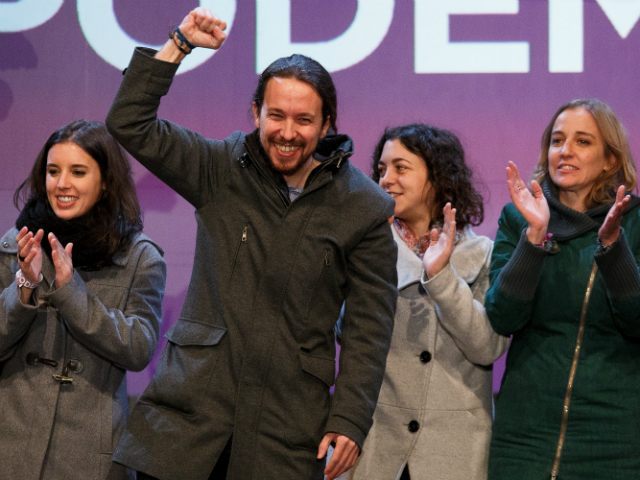Late Venezuelan dictator Hugo Chávez poured over seven million euros into the creation of a political party in Spain run by “natural allies of the Bolivarian revolution,” according to a 2008 document appropriating Venezuelan funds to the leftist professors who would become the leaders of Podemos, now Spain’s largest third party.
Spain’s ABC newspaper obtained the document, written by Chávez’s former Popular Finance Minister Rafael Isea and signed and approved by Chávez himself, that outlines the appropriation of 7.168.090 euros to an organization called the Center for Political and Financial Studies (CEPS), run by the leftist professors now in charge of Podemos. The document, dated May 28, 2008, designates this funding to be used to “strengthen ties and commitments to distinguished representatives of fundamentally anti-capitalist leftist schools of thought, which in Spain can create a consensus of political powers and social movements, effecting in that country political changes even more in tune with the Bolivarian government.”
Venezuela funneled the money into CEPS between the years 2003 and 2011.
The report goes on to name professors who are now high-ranking members of Podemos as “natural allies of the Bolivarian revolution… who represent a school of thought of revolutionary advancement” including the party’s leader, Pablo Iglesias.
Podemos has become a political force in Spain, founded in 2014 by Iglesias and riding the popularity of the “Indignados,” the Spanish equivalent of the Occupy Movement, to win 65 legislative seats in the Spanish parliament and prevent the ruling right-wing Popular Party from forming a government.
Before founding Podemos, Iglesias was the head of CEPS, which ABC notes disbanded after multiple reports indicated it was a pet project of the socialist Venezuelan government. The ABC report published this week is not the first indication that Iglesias’s rise was orchestrated by Venezuela; in 2014, Spain’s center-left El País newspaper reported that the CEPS had accepted 3.7 million euros from the Venezuelan government since 2002. Iglesias denied that any of that money went into promoting Podemos at the time.
A report released a year later by a coalition of Spanish attorneys known as Clean Hands (“Manos Limpias”) accused Podemos of receiving millions in “undeclared” Venezuelan money, though it did not present an exact figure.
The Venezuelan government has never made any effort to hide the fact that Podemos was an ideological ally of the regime, which has received international condemnation for its treatment of pro-democracy political dissidents, which has included beatings, torture, unjust imprisonment, and assassination. “That is Chavismo, traveling around the whole world,” Venezuelan socialist leader Diosdado Cabello said of Podemos in 2015, while still the head of the nation’s legislator and second-in-command.
Nor has Iglesias made any attempts to hide his belief that political advancement requires fomenting ties to unsavory groups. In addition to working with the government of Venezuela, Iglesias has accepted money from the Islamist regime of Iran, hosting a television program in Spanish on Tehran’s HispanTV. As the host of the talk show Fort Apache, Iglesias defended negotiations with terrorists by quoting Chinese mass murderer Mao Ze Dong, arguing, “Unfortunately, politics is often built over corpses and the suffering of entire people. Today, we talk of peace, which as we all know, is built on the results of war.” Challenged at a leftist talk for working with a regime that oppresses women and religious minorities, Iglesias noted that Venezuela, too, has close ties to Iran, “a state that murders communists, where women have to wear burqas.” He argued working with Iran was a necessary evil for him, just as “some people have to work for Coca-Cola or Walmart.”
While Podemos has inarguably become a formidable political force, its support among Spaniards is plummeting. A poll published by El País found that, should an election be held today, Podemos would receive 15.9 percent of the vote, five percent less than it did last year. Only 37 percent of registered members of Podemos approve of the job Iglesias is doing as leader. The numbers are particularly concerning for the party given that, should the PP be unable to form a coalition government, a new election may occur as early as June.

COMMENTS
Please let us know if you're having issues with commenting.